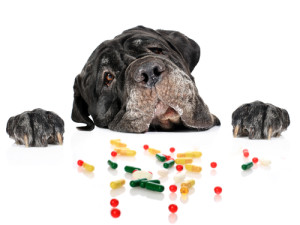Naturally, pets are curious, and they may eat anything interesting to them. If they accidentally consume toxic substances, this can lead to critical medical problems. However, if you are aware of common household items poisonous to pets that may be left out in their reach, you can protect your pets from ingesting anything that could be poisonous or dangerous to them.
Common household items poisonous to pets:
 Over The Counter And Prescription Medications
Over The Counter And Prescription Medications
Prescription medications and over the counter drugs are often left in purses or on night stands which may be easy to reach places for pets. Although there are medications for humans that can also be used for pets when properly instructed by your veterinarian, if given in the incorrect dosages, these medications can be toxic to our pets. For example, Tylenol has acetaminophen, which causes intense liver damage while Ibuprofen causes gastric ulcers as well as kidney failure to pets and especially dogs. All medications should be kept in childproof jars out of reach from our pets on a high shelf or in a closed drawer.
 Chocolate
Chocolate
Chocolate is comprised of theobromine and caffeine, which can cause result in chocolate toxicosis. Dark chocolate and Baker’s chocolate are the most toxic to dogs and cats. Milk chocolate can also be toxic if eaten in large amounts. If consumed, this can cause symptoms such as vomiting, restlessness, seizures, tremors and abnormal heart rates. Consumption of chocolate can be lethal to pets. Make sure you keep chocolate and coffee far from the reach of your pets.
Antifreeze
If you like to care for your car on your own, keep antifreeze on a high shelf in your garage or enclosed in a cabinet your pets can’t access. Pets may also come into contact with antifreeze in garages after it drips from the radiator. If your car tends to leak, don’t let your pets walk on the garage floor unattended. Antifreeze is made up of ethylene glycol, which is highly poisonous to pets. On consumption, the brain, liver, and kidney of the pet will be affected. Some common signs of antifreeze poisoning in pets are vomiting, diarrhea, seizures, drunken behavior, weakness, and rapid heart beat.
Air Fresheners
Did you know that your air fresheners may actually be harming your pet? Many air fresheners contain synthetic perfumes which can be toxic to your pet. Your pet may first begin reacting to your air freshener by sneezing, and his/her eyes and nose may discrete a discharge. If left unchanged, your pet can experience gastrointestinal issues, respiratory reactions, and even immune system damage.
Paint
Paint can also be toxic to pets. Pets can contract lead poisoning by licking lead paint. One of the more common dangers comes from the fumes of paint while you’re renovating your home. Your pet can be sensitive to these fumes, and may experience issues like vomiting and respiratory stress. If you will be renovating or repainting, then it’s best to keep your pets somewhere else for a few days until the fumes have dissipated.
Rat Poison
If you have a mouse or rat problem in your home or garage, your first solution may be to get some rat poison. This is a bad idea if you have pets. Rat poison is highly toxic to pets, and once pets ingest it, it can be very difficult to spot the symptoms of poisoning in time to save their lives. Even more worrisome is the fact that your pet can be poisoned by eating a mouse or rat which has eaten the poison. It only takes a bit of mouse or rat poison to kill an animal, so use traps instead if you have pets present in your home.
 Cigarette Smoke
Cigarette Smoke
Smoking cigarettes can have a major impact on your pet’s health. If you smoke in the house or the car, your pet is subjected to secondhand smoke, which is toxic. Secondhand smoke may cause respiratory issues in your pet, and it’s also been shown to cause tumors and cancer in pets with prolonged exposure.
Garbage
While you might not think of garbage as being very dangerous, it can be toxic for your pet. If your pet gets into the garbage, he/she may eat rotting food, bones, or even old medications which can all be toxic. Make sure that your garbage is completely secure.
Finally, other household items that are poisonous to pets include; grapes and raisins, alcohol, onions, Xylitol sweeteners, and fertilizers. As a pet parent, it is advisable to avoid sharing or keeping in reach any product or food you are using if you are not sure if it will have a negative impact on your pets.
What are some of your methods for keeping your common household items poisonous to pets away from your pet?

I stopped buying gum because although I love it, I was afraid a dog would somehow get into it. I try to buy non-toxic cleaners when possible and keep everything out of our dog’s reach.
That’s great you put the dogs safety ahead of your desire to chew gum fearing a dog would get to it. Given how our pets often the lick the floor looking for crumbs, it is so important to make sure cleaning supplies are non-toxic to pets.